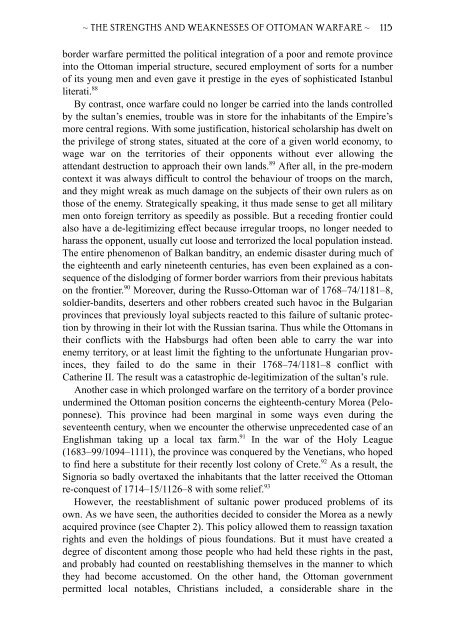The Ottoman Empire and the World Around It - Course Information
The Ottoman Empire and the World Around It - Course Information
The Ottoman Empire and the World Around It - Course Information
You also want an ePaper? Increase the reach of your titles
YUMPU automatically turns print PDFs into web optimized ePapers that Google loves.
~ THE STRENGTHS AND WEAKNESSES OF OTTOMAN WARFARE ~ 115<br />
border warfare permitted <strong>the</strong> political integration of a poor <strong>and</strong> remote province<br />
into <strong>the</strong> <strong>Ottoman</strong> imperial structure, secured employment of sorts for a number<br />
of its young men <strong>and</strong> even gave it prestige in <strong>the</strong> eyes of sophisticated Istanbul<br />
literati. 88<br />
By contrast, once warfare could no longer be carried into <strong>the</strong> l<strong>and</strong>s controlled<br />
by <strong>the</strong> sultan’s enemies, trouble was in store for <strong>the</strong> inhabitants of <strong>the</strong> <strong>Empire</strong>’s<br />
more central regions. With some justification, historical scholarship has dwelt on<br />
<strong>the</strong> privilege of strong states, situated at <strong>the</strong> core of a given world economy, to<br />
wage war on <strong>the</strong> territories of <strong>the</strong>ir opponents without ever allowing <strong>the</strong><br />
attendant destruction to approach <strong>the</strong>ir own l<strong>and</strong>s. 89 After all, in <strong>the</strong> pre-modern<br />
context it was always difficult to control <strong>the</strong> behaviour of troops on <strong>the</strong> march,<br />
<strong>and</strong> <strong>the</strong>y might wreak as much damage on <strong>the</strong> subjects of <strong>the</strong>ir own rulers as on<br />
those of <strong>the</strong> enemy. Strategically speaking, it thus made sense to get all military<br />
men onto foreign territory as speedily as possible. But a receding frontier could<br />
also have a de-legitimizing effect because irregular troops, no longer needed to<br />
harass <strong>the</strong> opponent, usually cut loose <strong>and</strong> terrorized <strong>the</strong> local population instead.<br />
<strong>The</strong> entire phenomenon of Balkan b<strong>and</strong>itry, an endemic disaster during much of<br />
<strong>the</strong> eighteenth <strong>and</strong> early nineteenth centuries, has even been explained as a consequence<br />
of <strong>the</strong> dislodging of former border warriors from <strong>the</strong>ir previous habitats<br />
on <strong>the</strong> frontier. 90 Moreover, during <strong>the</strong> Russo-<strong>Ottoman</strong> war of 1768–74/1181–8,<br />
soldier-b<strong>and</strong>its, deserters <strong>and</strong> o<strong>the</strong>r robbers created such havoc in <strong>the</strong> Bulgarian<br />
provinces that previously loyal subjects reacted to this failure of sultanic protection<br />
by throwing in <strong>the</strong>ir lot with <strong>the</strong> Russian tsarina. Thus while <strong>the</strong> <strong>Ottoman</strong>s in<br />
<strong>the</strong>ir conflicts with <strong>the</strong> Habsburgs had often been able to carry <strong>the</strong> war into<br />
enemy territory, or at least limit <strong>the</strong> fighting to <strong>the</strong> unfortunate Hungarian provinces,<br />
<strong>the</strong>y failed to do <strong>the</strong> same in <strong>the</strong>ir 1768–74/1181–8 conflict with<br />
Ca<strong>the</strong>rine II. <strong>The</strong> result was a catastrophic de-legitimization of <strong>the</strong> sultan’s rule.<br />
Ano<strong>the</strong>r case in which prolonged warfare on <strong>the</strong> territory of a border province<br />
undermined <strong>the</strong> <strong>Ottoman</strong> position concerns <strong>the</strong> eighteenth-century Morea (Peloponnese).<br />
This province had been marginal in some ways even during <strong>the</strong><br />
seventeenth century, when we encounter <strong>the</strong> o<strong>the</strong>rwise unprecedented case of an<br />
Englishman taking up a local tax farm. 91 In <strong>the</strong> war of <strong>the</strong> Holy League<br />
(1683–99/1094–1111), <strong>the</strong> province was conquered by <strong>the</strong> Venetians, who hoped<br />
to find here a substitute for <strong>the</strong>ir recently lost colony of Crete. 92 As a result, <strong>the</strong><br />
Signoria so badly overtaxed <strong>the</strong> inhabitants that <strong>the</strong> latter received <strong>the</strong> <strong>Ottoman</strong><br />
re-conquest of 1714–15/1126–8 with some relief. 93<br />
However, <strong>the</strong> reestablishment of sultanic power produced problems of its<br />
own. As we have seen, <strong>the</strong> authorities decided to consider <strong>the</strong> Morea as a newly<br />
acquired province (see Chapter 2). This policy allowed <strong>the</strong>m to reassign taxation<br />
rights <strong>and</strong> even <strong>the</strong> holdings of pious foundations. But it must have created a<br />
degree of discontent among those people who had held <strong>the</strong>se rights in <strong>the</strong> past,<br />
<strong>and</strong> probably had counted on reestablishing <strong>the</strong>mselves in <strong>the</strong> manner to which<br />
<strong>the</strong>y had become accustomed. On <strong>the</strong> o<strong>the</strong>r h<strong>and</strong>, <strong>the</strong> <strong>Ottoman</strong> government<br />
permitted local notables, Christians included, a considerable share in <strong>the</strong>


